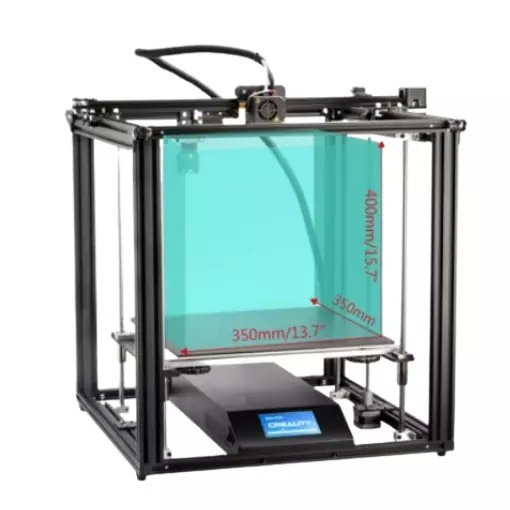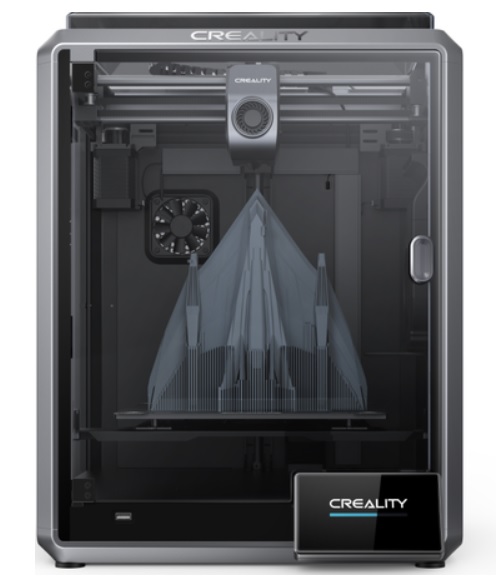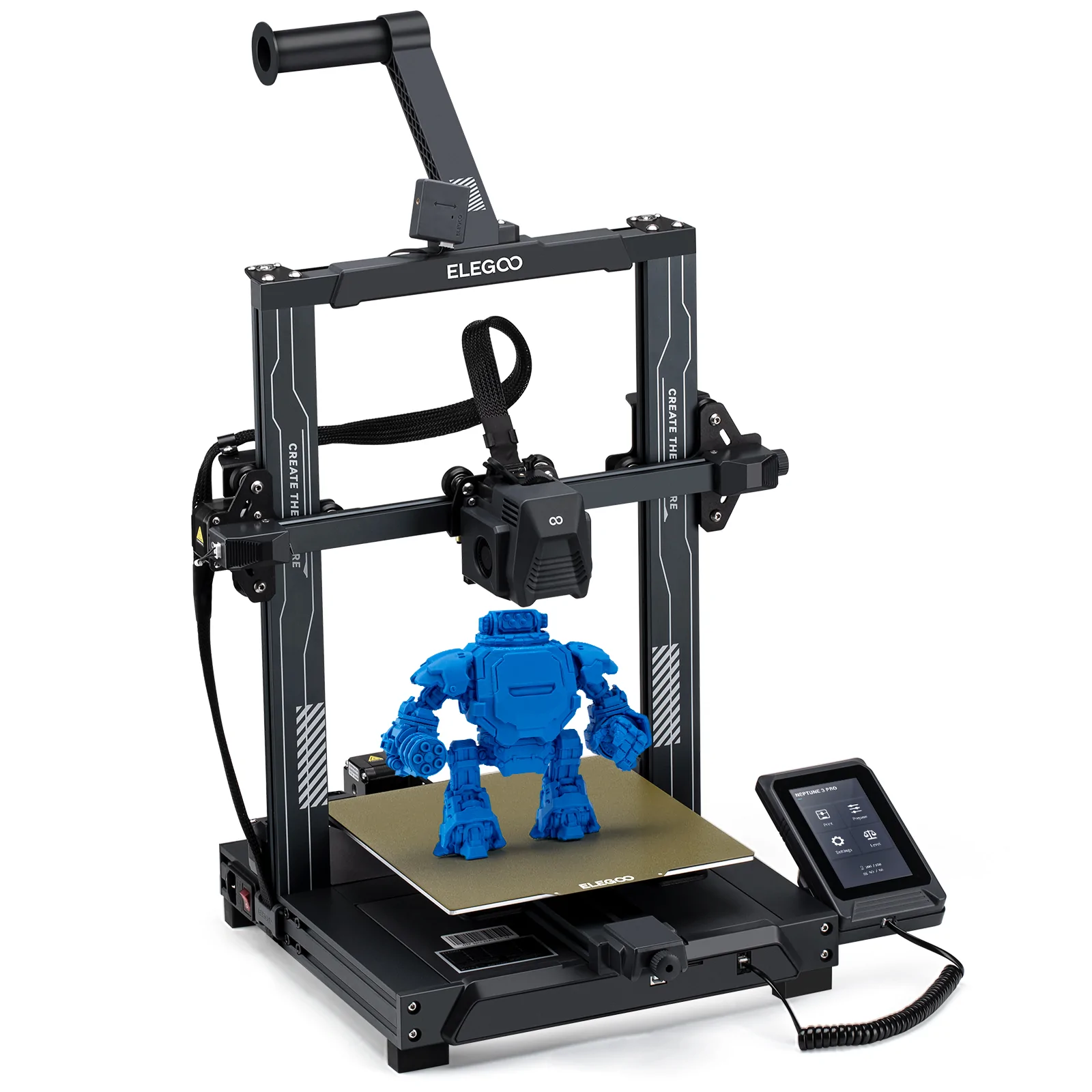Compare Ender 5 Plus vs K1 vs Neptune 3 PRO
Comparison between the best 3D printers
Choose the best 3D printer at the best price. The cheapest 3D printers are here.
Buy a 3D printer here with 3D Fila.
 |
 |
 |
|
| Model | Ender 5 Plus[BUY Ender 5 Plus] |
K1[BUY K1] |
Neptune 3 PRO |
| Estimated price | $599,00 | $399,00 | $230,00 |
| Fabricante | Creality 3D | Creality 3D | Elegoo |
| Release Year | 2019 | 2023 | 2022 |
| Print Volume [mm] | 350x350x400 | 220x220x250 | 225x225x280 |
| Printer Size [mm] | 632x619x666 | 355x355x480 | 445x515x475 |
| Weight [kg] | 18,2 | 12,5 | 8,1 |
| Power Loss Recovery | YES | YES | YES |
| Enclosed printer | NO | YES | NO |
| Bed Leveling | Automatic | Automatic | Automatic |
| Filament End Sensor | YES | YES | YES |
| Bed type | Heated | Heated | Heated |
| Power supply system | Bowden | Direct Drive | Direct Drive |
| Standard nozzle | 0,4 | 0,4 | 0,4 |
| Maximum Nozzle Temperature [°C] | 260 | 300 | 260 |
| Maximum Bed Temperature [°C] | 100 | 120 | 100 |
| Maximum printing speed [mm/s] | 180 | 600 | 80 |
| Filament holder | YES | YES | YES |
| Camera for supervision | NO | NO | NO |
| Recommended filaments | PLA, TPU, ABS, PETG | ABS, PLA, PETG, PET, TPU, PA, ABS, ASA, PC, PLA-CF, PA-CF, PET-CF | PLA, PETG, Tritan, Flex, ABS |
| Recommended slicers | Cura, Simplify, Slic3r | Creality Print; Cura, Simplify3D e PrusaSlicer | Cura, Simplify, Slic3r, IdeaMaker e outros |
| Maximum Resolution [mm] | 0,1 | 0,1 | 0,1 |
| Processor | 32 bits | ||
| Display | Touchscreen TFT 4,3'' | Display touchscreen 4,3'' | Display touchscreen 4,3'' |
| Power Supply | 24V / 504W | 110/220V / 350W | 250 |
| Connectivity | SD / USB | Ethernet / USB / Wi-Fi | |
| Operating systems | Windows, Mac, Linux | Windows, Mac, Linux | Windows, Mac, Linux |
| Date of registration in the system | 2021-04-14 | 2023-04-17 | 2023-03-02 |
| Release date | 2019 | 2023 | 2022 |
| Extra features | The Ender 5 Plus offers a large print volume (350x350x400 mm) and fast assembly. It includes a BLTouch sensor, but with range limitations. It stands out for its dimensional accuracy, although it requires adjustments to the slicer settings. Despite the noise, its integrated design saves space, and includes features such as a filament sensor and power resumption. Ideal for large projects, it requires refinement in the settings for high-quality prints. | The K1 is an extremely fast FDM 3D printer, reaching 600mm/s, 12 times faster than standard models. Equipped with a Core XY system and lightweight print head, it offers energy efficiency and high print quality. It stands out for its dual-gear extruder and quickly heated hotend, as well as dual cooling to prevent warping. Its robust structure ensures stability at high speed, with optimized software to speed up the printing process. | The Elegoo Neptune 3 Pro printer stands out for its easy assembly and automatic bed leveling, ideal for different levels of users. Equipped with a direct-drive extruder and dual gears, it offers excellent adhesion to slippery materials such as TPU. It incorporates dual screws on the Z-axis, ensuring stable prints, and features an integrated task light for improved visibility. With a PEI-coated build plate and a detachable touchscreen, it combines functionality and convenience. The printer also features an efficient cooling system, filament sensor and a simplified user interface. |
| Support for multiple colors and materials (AMS and CFS) | NO | NO | NO |
Notes * |
|||
| Cost-benefit | 6 / 10 | 8 / 10 | 7 / 10 |
| Hardware | 2 / 10 | 4.8 / 10 | 2.8 / 10 |
| Screen | . | . | . |
| Print volume | 4 / 10 | 3 / 10 | 3 / 10 |
| Performance | 1 / 10 | 5 / 10 | 0 / 10 |
| [BUY Ender 5 Plus] | [BUY K1] |
Conclusion |
| In conclusion, the comparison between the Ender 5 Plus, K1, and Neptune 3 PRO 3D printers provides a clear distinction based on features, performance, and price, allowing users to make an informed choice based on their needs and budget. The **Ender 5 Plus** is the most expensive option, offering a substantial build volume and solid performance, especially for larger projects. It boasts dimensional accuracy and several features such as a power loss recovery system and filament sensor, making it suitable for hobbyists and semi-professionals. However, it requires some fine-tuning for optimal print quality and can be noisy during operation. The **K1**, although cheaper than the Ender 5 Plus, shines with its exceptional speed of up to 600 mm/s, making it a great choice for users prioritizing efficiency without compromising print quality. Its advanced features, including a Core XY system and dual-gear extruder, present a substantial upgrade in technology. This printer combines robust engineering and user-friendly interfaces, making it well-suited for both novice and experienced users looking for high performance. The **Neptune 3 PRO** is the most budget-friendly option while still providing decent features such as automatic bed leveling and a direct-drive extruder, which ensures better material handling. Although it has smaller print volume and slower maximum print speeds, it is an excellent choice for those new to 3D printing or anyone with limited space or resources. Its ease of assembly and user-centric design appeal to a wider audience. Overall, if your priority is larger print capabilities and premium features, the Ender 5 Plus is a solid investment. However, for those seeking speed and advanced technology at a reasonable price, the K1 stands out as a leading option. Meanwhile, the Neptune 3 PRO offers tremendous value for beginners or casual users. Each printer has its unique strengths, and the right one depends on specific user needs and priorities. |

